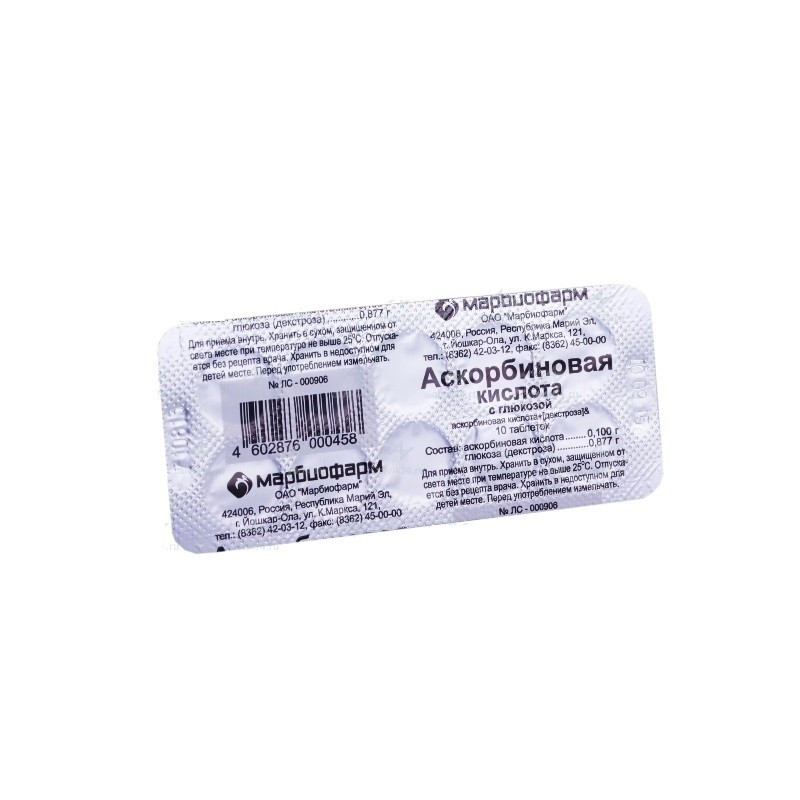



 All payments are encrypted via SSL
All payments are encrypted via SSL
 Full Refund if you haven't received your order
Full Refund if you haven't received your order
- Hypo-and vitamin C deficiency;
- Increased need for Ascorbic acid (the period of intensive growth, pregnancy, lactation, increased physical activity, the period of convalescence).
Allergic reactions, irritation of the gastrointestinal mucosa (nausea, vomiting, diarrhea, gastrointestinal spasm); inhibition of the function of the insular apparatus of the pancreas (hyperglycemia, glycosuria); when used in high doses, hyperoxaluria and nephrocalcinosis (oxalate).
Changes in laboratory parameters: thrombocytosis, hyperprothrombinemia, erythropenia, neutrophilic leukocytosis, hypokalemia.
- hypersensitivity;
- children's age (up to 3 years).
C caution: diabetes, glucose-6-phosphate dehydrogenase deficiency; for use in high doses - hemochromatosis, sideroblastic anemia, thalassemia, hyperoxaluria, nephurolythiasis.
Use during pregnancy and lactation
In appointing the drug should carefully study the instructions for use.
Application for violations of kidney function
In connection with the stimulating effect of ascorbic acid on the synthesis of corticosteroid hormones, it is necessary to monitor the kidney function and blood pressure.
Contraindication - children's age (up to 3 years).
In appointing the drug to children over 3 years should carefully study the instructions for use.
In connection with the stimulating effect of ascorbic acid on the synthesis of corticosteroid hormones, it is necessary to monitor the kidney function and blood pressure.
With long-term use of large doses, the function of the insular apparatus of the pancreas may be inhibited, therefore during treatment it must be regularly monitored.
In patients with a high content of iron in the body, ascorbic acid should be used in minimal doses.
The administration of ascorbic acid to patients with rapidly proliferating and intensely metastatic tumors can aggravate the process.
Ascorbic acid as a reducing agent can distort the results of various laboratory tests (blood glucose, bilirubin, activity of liver transaminases and LDH).
Symptoms: when using more than 1 g - headache, increased central nervous system excitability, insomnia, nausea, vomiting, diarrhea, hyperacid gastritis, ulceration of the gastrointestinal mucosa, inhibition of the function of the insular apparatus of the pancreas (hyperglycemia, glycosuria), hyperoxaluria, nephrolithiasis (from Calcium oxalate) damage to the glomerular apparatus of the kidneys, moderate pollakiuria (when taking a dose of more than 600 mg / day). Reduced capillary permeability (possibly worsening of tissue trophism, increased blood pressure, hypercoagulation, microangiopathy development.
Vitamin C
Increases blood concentration of benzylpenicillin and tetracyclines; at a dose of 1 g / day increases the bioavailability of ethinyl estradiol (including part of the oral contraceptives).
Improves the absorption in the intestines of iron preparations (converts ferric iron into ferrous); may increase the excretion of iron while using with deferoxamine.
Reduces the effectiveness of Heparin and indirect anticoagulants.
Acetylsalicylic acid, oral contraceptives, fresh juices and alkaline drinks reduce absorption and absorption. With simultaneous use with Acetylsalicylic acid increases the excretion of urine ascorbic acid and decreases the excretion of acetylsalicylic acid. Acetylsalicylic acid reduces the absorption of ascorbic acid by about 30%.
Increases the risk of crystalluria in the treatment of short-acting salicylates and sulfonamides, slows the kidneys excretion of acids, increases the excretion of drugs that have an alkaline reaction (including alkaloids), reduces the concentration in the blood of oral contraceptives.
Increases the overall clearance of ethanol, which in turn reduces the concentration of ascorbic acid in the body.
Drugs quinoline, calcium chloride, salicylates, corticosteroids with long-term use depletes reserves of ascorbic acid.
With simultaneous use reduces the chronotropic effect of isoprenaline.
With prolonged use or use in high doses may disrupt the interaction of disulfiram-ethanol.
In high doses, increases the excretion of meksiletina kidneys.
Barbiturates and primidone increase the excretion of ascorbic acid in the urine.
Reduces the therapeutic effect of antipsychotics (neuroleptics) - phenothiazine derivatives, tubular reabsorption of amphetamine and tricyclic antidepressants.
Terms and conditions of storage
Store in a dry, protected from light, out of reach of children, at a temperature not exceeding 25 ° C.
